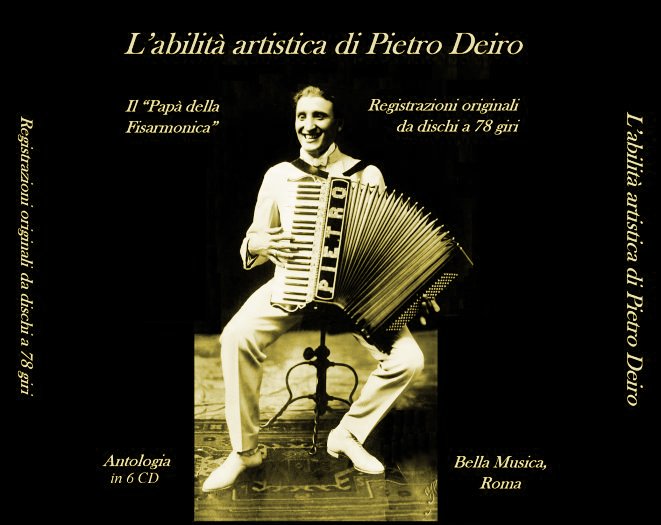
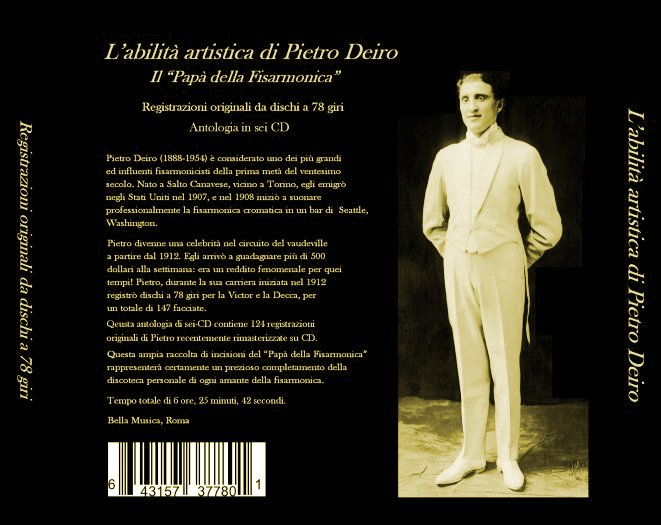
The Artistry of Pietro Deiro
The "Daddy" of the Accordion
Original Recordings from 78 RPM Records
Six Compact Disc Set
124 tracks
Total Time: 6 hours, 25 minutes, 42 seconds
Includes 12-page printed CD booklet (Track listings in English, Biographical Notes in Italian)
Label: Bella Musica, Roma
Released 2007
Imported from Italy
To order, contact henrydoktorski@gmail.com.


Tracks
CD 1: Recordings from 1914
- Pietro Deiro: Pietro's Return March
- S. Falco: Beautiful Days Waltz
- Calixa Lavallée: Pride of the Roses Fantasia
- Arrepentimiento (Repentance)
- Émile Waldteufel: Les Sirènes
- Ion Ivanovici: Donauwellen (Danube Waves)
- John T. Hall: Wedding of the Winds
- James V. Monaco-William Travers Jerome: Row Row Row
- Irving Berlin: When the Midnight Choo Choo Leaves for Alabama
- James V. Monaco-Joe McCarthy: I Love Her, Oh! Oh! Oh! (Duet with Guido Deiro)
- L. Wolfe Gilbert-Lewis F. Muir:
- Mammy Jinny's Jubilee
- Here Comes My Daddy Now
- James V. Monaco-Joe McCarthy:
- I Love Her, Oh! Oh! Oh!
- You Made Me Love You (I Didn't Want to Do It)
- Irving Berlin: International Rag
- George Botsford/Albert Gumble-Andrew K. Allison:
- Sailing Down Chesapeake Bay
- On a Good Old Time Sleigh Ride
- Irving Berlin:
- This Is The Life
- My Averne Rose
- Paul Lincke: Luna Waltz
- Irving Berlin:
- Down In Chattanooga
- Kiss Your Sailor Boy Good-Bye
- Sebastián Yradier: La Paloma
- Colombini: Tripoli March
- Friedrich von Flotow: Stradella Overture
- Johann Strauß: Blue Danube Waltz
- Resois: Sharpshooter's March
CD 2: Recordings from 1914-1915
- Primi: Firefly
- Abe Holzmann: Blaze Away March
- Pietro Deiro: Tranquillo Overture (version 1)
- Pietro Deiro: Tranquillo Overture (version 2)
- Giuseppe Verdi: Rigoletto Quartet
- Franz von Suppé: Light Cavalry Overture
- Julius Lenzberg: Hungarian Rag
- Vincenzo di Chiara/Alberto Pestalozza:
- La Spagnola
- Ciribiribin
- Maurice Abrahams-Grant Clarke:
- They Start the Victrola
- All He Does Is Follow Them Around
- George W. Meyer-Alfred Bryan/Percy Wenrich:
- High Cost of Loving
- When You Wore a Tulip
- Joe Young-Edgar Leslie-Maurice Abrahams/Grant Clarke-Maurice Abrahams:
- When the Grown-Up Ladies Act Like Babies
- You Great Big Bashful Doll
- Grant Clarke-Jean Schwartz/Irving Berlin:
- Back to the Carolina You Love
- I Want to Go Back to Michigan (Down on the Farm)
- Charles Gounod: Faust Waltz from Kermesse Scene
- Polka sur les Airs Italiens
- Pietro Deiro: Abundance Waltz
- Dixie Vals
- Ruggero Leoncavallo: Pagliacci: Vesti La Giubba
- Traditional/Eduardo di Capua/Sebastián Yradier/Luigi Denza:
- La Sorella
- O Solo Mio
- La Paloma
- Funiculi Funicula
- Pietro Deiro: Verona Waltz
- Antonio Carlos Gomes: Il Guarany Selection
- Émile Waldteufel: Estudiantina Waltz
CD 3: Recordings from 1915-1917
- Jack Yellen-George L. Cobb/Dave Radford-Richard A. Whiting:
- Alabama Jubilee
- Tulip Time In Holland
- John Philip Sousa:
- El Capitan
- Stars and Stripes Forever
- Washington Post March
- Vincenzo Bellini: Romeo and Juliet Overture
- Gioachino Rossini: Barber of Seville Overture
- Keler-Bela Adabert: Comedy Overture
- Pietro Deiro: Trieste Overture
- Franz von Suppé: Pique Dame Overture
- Calixa Lavallée: Bridal Rose Overture
- Franz von Suppé: Poet and Peasant Overture
- Pietro Mascagni: Cavalleria Rusticana Intermezzo (Pietro Deiro with the Marconi brothers: Vittorio, Valentino and Ernesto on button accordions)
- Juventino Rosas: Over The Waves
- S. R. Henry: By Heck
- Jean Schwartz-Bert Kalmar-Edgar Leslie/E. Ray Goetz-Joe Young-Pete Wendling:
- Hello Hawaii, How Are You
- Yaaka Hula Hickey Dula (Hawaiian Love Song)
- Pietro Deiro: San Francisco Souvenir March
- Grant Clarke-Eddie Cox-Jimmie V. Monaco/Fred Fisher-Grant Clarke:
- Honolulu, America Loves You
- There's A Little Bit of Bad In Every Good Little Girl
- Chas. McCarron-Albert Von Tilzer:
- When the Sun Goes Down in Dixie
- Where the Swanee River Flows
- Pietro Deiro: Heart Echoes (Mimicri Intermezzo)
- Josef Wagner: Under the Double Eagle March
- American National Airs:
- America
- Marching Through Georgia
- Dixie
- Bugle Call
- Battle Hymn of the Republic
- Yankee Doodle
- Dixie
- Patriotic Airs of the Allies:
- Italy:
- Italian National Air
- Garibaldi Hymn
- England: Rule Britannia
- France: La Marseillaise
CD 4: Recordings from 1917-1923
- Billy Baskette: Goodbye Broadway, Hello France
- C. Arthur Pfeiffer: We're Going Over (Somewhere In France)
- Sam M. Lewis-Joe Young-M. K. Jerome/Alfred Bryan-Willie Weston-Jack Wells:
- Just a Baby's Prayer at Twilight (For Her Daddy Over There)
- Joan of Arc (They Are Calling You)
- Albert von Tilzer-Brown/Henry Creamer-Turner Layton:
- I May Be Gone For a Long Time
- Sweet Emalina My Gal
- Alfred Bryan-Joe McCarthy-Fred Fisher/Joseph McCarthy-Harry Caroll:
- Oui Oui, Marie
- I'm Always Chasing Rainbows
- George W. Meyer/Percy Wenrich/Bob Carleton:
- You'll Find Old Dixieland In France
- I Ain't Got Weary Yet
- Ja-Da
- Bert Rule: Have A Smile For Everyone You Meet (And They Will Have A Smile For You)
- Mary Earl: Ruspana
- Harry Ruby-Pete Wendling-Bert Kalmar/Sam M. Lewis-Joe Young-Fred Ahlert:
- Take Your Girlie to the Movies (If You Can't Make Love At Home)
- Who Played Poker with Pocahontas (When John Smith Went Away)
- Walter Donaldson/Irving Berlin:
- My Sahara Rose
- After You Get What You Want You Don't Want It
- Mel B. Kaufman: Stop It!
- Joe McCarthy-Harry Tierney/Jack Yellow-Milton Ager-George Meyer:
- My Baby's Arms
- There's a Lot of Blue-Eyed Mary's Down in Maryland
- Henriette Blanke-Belcher: Marsovia Waltz
- Ernesto Becucci: My Treasure Waltz (Tesoro Mio)
- Otto Bonnell: Turkey In The Straw (A Rag Time Fantasy)
- George Cobb: Russian Rag
- Gaetano Donizetti/Giacomo Puccini/Friedrich von Flotow:
- Hail to the Happy Bridal Day from Lucia di Lammermoor
- Musetta's Waltz from La Bohème
- Ah, May Heaven Forgive You from Martha
- Archibald Joyce: Vision of Salome
- Walter Rolfe: Kiss of Spring
- Juan d'Arienzo: El Esquinazo Tango
- Sydney P Harris: Paquita (Mexican serenade)
CD 5: Recordings from 1923-1931
- Riccardo Drigo: Valse Bluette
- Victor Herbert:
- March of the Toys
- I Can't Do the Sum (from Babes In Toyland)
- Kiss Me Again (from Mlle. Modiste)
- Oriental Dance (from Wonderland)
- Mario Costa/De Curtis/Nutile/Di Capua:
- A Frangesa
- Carme
- Mama Mia
- Che Vo Sape
- Carcioffola
- Arienzo: Lido Mazurka
- Luigi Arditi: The Kiss (Il Bacio)
- Valverde: The Broadway Waltz
- Pietro Deiro: Dora Mazurka
- Villard-Christiné-Vincent Scotto: La Petite Tonkinoise
- Italian Airs I
- Italian Airs II
- Pietro Deiro: The Accordionist March
- Pietro Deiro: Prior Accordion Club March
- Pietro Deiro: Vivacity Polka
- Ambroise Thomas: Entr'acte Gavotte from Mignon
- Pietro Deiro: Elvira
- Octave Crémieux: Love's Last Word
- Frank Gaviani: Accordionette (Duet with Frank Gaviani)
- Frank Gaviani: Accordionola (Duet with Frank Gaviani)
- John Philip Sousa: Stars and Stripes Forever
- John Philip Sousa: Washington Post March
CD 6: Recordings from 1931-1950
- Ángel G. Villoldo: El Choclo
- Cesare Andrea Bixio: Parlami d'Amore, Mariù
- Gerardo Matos Rodríguez: La Cumparsita
- Aria Continental
- Branzoli: La Capricciosa Polka
- Alberto Pestalozza/Eduardo di Capua:
- Ciribiribin
- O Solo Mio
- Pietro Deiro: April Smiles Waltz
- Vincenzo di Chiara/Carlos Fernández:
- La Spagnola
- Cielito Lindo
- Pietro Deiro: Pietro's Return
- Filippo Schreier-Aldo Bottero/Pietro Deiro-El Vera Collins:
- Tango of the Roses
- Who'll Serenade You
- Giuseppe Blanc/Richelli-Mario Ruccione:
- Giovinezza, giovinezza
- Facetta nera
- Franz von Suppé: Beautiful Galathea (Die Schöne Galathea)
- Vincenzo Bellini: Romeo and Juliet Overture
- Pietro Deiro: Quick Silver
- Pietro Deiro: Chanticleer
- Pietro Deiro: Pietro's Return (Duet with Mindie Cere)
- Pietro Deiro: Tranquillo Overture (Duet with Mindie Cere)
- Vincenzo Bellini: Romeo and Juliet Overture (Duet with Mindie Cere)
- Pietro Deiro: Mancito Paso Doble (Duet with Mindie Cere)
- Pietro Deiro: Militare Overture
6 CD Anthology with Plastic Jewel Case
Review by Henry Doktorski:
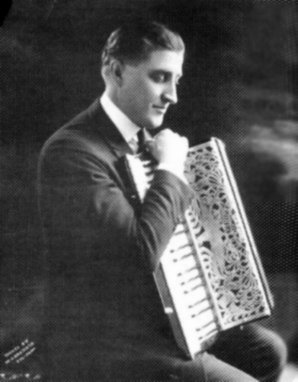
Pietro Deiro (1888-1954) is considered one of the greatest and most influential accordionists of the first half of the twentieth century. Born in Salto, Italy, he immigrated to the United States in 1907, and in 1908 began to play the diatonic button-accordion professionally at a saloon in Seattle, Washington.
That same year Pietro's older brother Guido (already an accomplished piano-accordionist in Europe) also immigrated to the United States, and there in Seattle he taught Pietro how to play the piano-accordion. Guido was a sensation and became a vaudeville star in 1910. Pietro, recognizing a good thing, followed in his brother's footsteps, and also became a celebrity on the vaudeville circuit at least by 1912. He earned up to $500 per week: a phenomenal income in those days.
One contemporary 1921 newspaper reviewer praised Pietro's musicianship: "What Paderewski is to the piano, Spalding to the violin, and Hans Kronol to the cello, Pietro is to the piano-accordeon. This man takes this instrument, which recently has attained a dignified standing among musicians, and gives it a human voice, a voice that is alive with joy, and dragged down to the depths of sorrow."
Pietro recorded 78 RPM records for Victor and Decca: a total of 147 sides during his career, beginning in 1912. Amazingly, Pietro enjoyed a flourishing recording career even during the Great Depression—a remarkable achievement, considering the doldrums the record industry was in at the time. Pietro dominated the solo accordion category in Victor's 1930 Italian catalog with a full eighteen sides (Pietro Frosini could only muster ten sides).
When the vaudeville industry began to decline, Pietro—a successful businessman—established a music studio in 1928 in Greenwich Village, New York, which attracted so many students that he had to hire a staff of professional teachers. Eventually he established a chain of accordion studios on the East coast.
Recognizing early on that his students needed sheet music, Pietro established the music publishing firm Accordion Music Publishing Company (AMPCO), later known simply as Pietro Deiro Publications. Pietro composed over 200 original works for the accordion and arranged countless other pieces.
Pietro was popular and influential. He appeared as a regular columnist for general music publications such as The Etude and Metronome magazines, and he participated prominently in the main accordion journals of the 1930s and 1940s such as Accordion World and Accordion News. He published his own newsletter called The Pietro Musicordion, he produced his own radio show, and he established a record company devoted to the accordion: AMPCO Records.
In 1936 Italian accordion manufacturers presented him with a parchment scroll and gold plaque for his contributions toward the advancement of the instrument. Pietro was one of the founding members of the American Accordionists' Association (created on March 9, 1938), and was elected the association's first president by the board.
One modern scholar, Peter Muir, explained: "He [Pietro] effectively became the premiere accordionist in America, a sort of legendary father-figure whose status was embodied by his nickname 'The Daddy of the Accordion,' which he carefully cultivated from early in the decade [beginning in 1930]."
L'abilità artistica di Pietro DeiroThis monumental 6-CD anthology was produced to commemorate the 100th Anniversary of Pietro Deiro's immigration to the United States. He arrived at Ellis Island in the Port of New York on September 21, 1907, on the steamship S. S. La Savoie sailing from Havre, France, and began playing professionally in Seattle within a year. The accordion world has never been the same since.
This is a truly magnificent CD anthology: six compact discs of 124 original recordings played by the "Daddy" of the Accordion from his 78 RPM records. These historic recordings—arranged in chronological order dating from 1914 until 1950—offer a priceless glimpse into the early days of the "Golden Age of the Accordion."
This important 6-CD release, which I believe will be eagerly welcomed by accordion lovers everywhere, could not have been accomplished without the selfless cooperation and generosity of the curators of phonograph libraries from three nations—Italy, Sweden and the United States—including:
- the prestigious academic institution which houses the extensive Pietro Deiro Archives donated by Pietro Deiro's granddaughter: The Center for the Study of Free-Reed Instruments at the Graduate Center of the City University of New York
- the educational organization for the preservation of accordion history based in Stockholm: The Frosini Society
- devoted accordion enthusiasts and private collectors of accordion memorabilia
Most of the tracks (112) are solos by Pietro, including 17 of his own original compositions:
Seven tracks are duets with:
- Pietro's Return (released in 1914 and 1937)
- Tranquillo Overture (1914 and 1915)
- Verona Waltz (1915)
- Trieste Overture (1916)
- San Francisco Souvenir March (1917)
- Heart's Echoes Serenade (Mimicri) (1917)
- Dora Mazurka (1927)
- Abundance Waltz (1930)
- April Smiles Waltz (1930)
- The Accordionist March (1930)
- Prior Accordion Club March (1930)
- Vivacity Polka (1930)
- Elvira Waltz (1937)
- Who'll Serenade You (1937) (composed with El Vera Collins)
- Quick Silver (1941)
- Chanticleer (1941)
- Militare Overture (1950)
- Pietro's elder brother Guido: I Love Her, Oh! Oh! Oh! (1914)
- Pietro's student Frank Gaviani: Accordionette and Accordionola (1931)
- Pietro's colleague Mindie Cere: Pietro's Return March, Tranquillo Overture, Mancito Paso Doble, and the Romeo and Juliet Overture (1941)
These four duets with Mindie Cere (and two solos by Pietro: Quick Silver and Chanticleer) were recorded during a live concert at the Manhattan Center in New York City on May 11, 1941, and never released until now!
There is one other track with two accordions: Dixie Vals, but I could not find any information about this piece or who might be the second accordionist.
It is especially exciting to hear the enthusiastic audience applause and appreciation for Pietro, who during this time was at the height of his fame and practically worshiped by admirers as the "Daddy" of the Accordion, as evidenced from his devoted accordion students who purchased plaster busts of their esteemed teacher which they reverently placed on their desks for inspiration, as a serious piano student might place on his piano a bust of Beethoven or Chopin.
Besides the eight duets listed above, four other tracks were recorded with other musicians: (1) Cavalleria Rusticana, (2) El Choclo, (3) Parlami d'Amore Mariu, and (4) La Cumparsita. The first—Cavalleria Rusticana (issued in 1916)—is performed with an accordion quartet: Pietro Deiro on piano-accordion with the Marconi Brothers (Victor, Valentino and Ernesto) on button-accordions. The next three pieces (issued in 1931 and 1934) feature, along with Pietro, a second accordionist (probably Frank Gaviani on a bass or cello accordion), a violinist (probably Alfred d'Auberge), a vibraphonist, and a musician playing maracas.
I found it especially fascinating listening to Pietro performing two very different solo versions of Tranquillo Overture on CD No. 2. The first version was released in 1914 and the second in 1915. It is interesting to discover how the piece evolved from 1914 to 1915 as Pietro's compositional skills developed. Tranquillo Overture appears again on CD 6 in the 1941 duet arrangement with Mindie Cere; each recording is unique.
There are also three versions of Pietro's Return: 1914, 1937 and 1941, and three versions of Bellini's Overture from Romeo and Juliet: 1916, c. 1930s, and 1941.
12-Page Booklet with Biographical Notes, Track Listings and Historic Photographs
In the 124 historic recordings on this 6-CD set we hear Pietro performing four distinctive styles of music: Classical, Ethnic, Patriotic and Popular.
(1) Classical and Operatic Transcriptions of Overtures, Arias and Waltzes by Renowned Composers:
- Franz von Suppé:
- Light Cavalry Overture
- Pique Dame Overture
- Die Schöne Galathea
- Poet and Peasant Overture
- Émile Waldteufel:
- Les Sirènes
- Estudiantina Waltz
- Friedrich von Flotow:
- Alessandro Stradella Overture
- Ah, May Heaven Forgive You from "Martha"
- Calixa Lavallée:
- Pride of the Roses Fantasia
- Bridal Rose Overture
- Charles Gounod: Waltz from "Faust"
- Riccardo Drigo: Valse Bluette
- Ion Ivanovici: Waves of the Danube
- Johann Strauß: Blue Danube Waltz
- Ambroise Thomas: Gavotte from "Mignon"
- Keler-Béla: Hungarian Comedy Overture
- Antônio Carlos Gomes: Selections from "Il Guarany"
- Giuseppe Verdi: Quartet from "Rigoletto"
- Gioachino Rossini: Overture from "Barber of Seville"
- Ruggero Leoncavallo: Vesti la Giubba from "Pagliacci"
- Vincenzo Bellini: Overture from "Romeo and Juliet"
- Giacomo Puccini: Musetta's Waltz from "La Bohème"
- Gaetano Donizetti: Hail to the Happy Bridal Day from "Lucia di Lammermoor"
- Pietro Mascagni: Intermezzo from "Cavalleria Rusticana"
- Pietro Deiro:
- Tranquillo Overture
- Trieste Overture
- Militare Overture
- Chanticleer
(2) Ethnic and International Favorites:
- Italian and Neapolitan Waltzes, Mazurkas and Tarantellas:
- Ciribiribin by Alberto Pestalozza
- La Spagnola by Vincenzo di Chiara
- My Treasure (Tesoro Mio) by Ernesto Becucci
- O Solo Mio by Eduardo di Capua
- Funiculì, Funiculà by Luigi Denza
- Lido Mazurka by Arienzo
- Dora Mazurka by Pietro Deiro
- Santa Lucia (traditional)
- French Polka:
- La Petite Tonkinoise by Villard-Christiné and Vincent Scott
- Spanish Habanera:
- La Paloma by Sebastián Yradier (Sebastián de Iradier y Salaverri)
- Mexican Songs:
- Cielito Lindo by Carlos Fernández
- Over the Waves (Sobre las Olas) by Juventino Rosas
- Uruguayan and Argentinean Tangos:
- La Cumparsita by Gerardo Matos Rodríguez
- El Choclo by Ángel G. Villoldo
- El Esquinazo by Juan d'Arienzo
- Tango of the Roses (Tango delle Rose) by Filippo Schreier and Aldo Bottero
- Who'll Serenade You by Pietro Deiro and El Vera Collins
(3) American and European Patriotic Hymns and Marches:
- Yankee Doodle
- The Battle Hymn of the Republic
- Daniel Emmett: I Wish I Was In Dixie
- Katharine Lee Bates-Samuel A. Ward: America (Oh beautiful, for spacious skies)
- Josef Wagner: Under the Double Eagle
- Marches by John Philip Sousa:
- Stars and Stripes Forever
- Washington Post March
- El Capitan
- Marches by Pietro Deiro:
- Pietro's Return March
- San Francisco Souvenir March
- The Accordionist March
- Prior Accordion Club March
- Abe Holzmann: Blaze Away March
- Colombini: Tripoli March
- Resois: Sharpshooter's March
- Rule Britannia
- La Marseillaise
- Garibaldi's Hymn
(4) Popular American Tin Pan Alley Hit Tunes of the 1910s and Roaring Twenties:
- Songs by Irving Berlin:
- Kiss Your Sailor Boy Goodbye
- I Want to Go Back to Michigan (Down on the Farm)
- This Is The Life
- Down In Chattanooga
- After You Get What You Want, You Don't Want It
- International Rag
- When the Midnight Choo Choo Leaves for Alabama
- Songs by Lewis F. Muir:
- Mammy Jinny's Jubilee
- Here Comes My Daddy Now
- Other Popular Songs
- Paul Linkce: Luna Waltz
- James V. Monaco: You Made Me Love You, I Didn't Want To Do It
- Joseph McCarthy and Harry Caroll: I'm Always Chasing Rainbows
- Rag Time
- Irving Berlin: International Rag
- Julius Lenzberg: Hungarian Rag
- Otto Bonnell: Turkey In The Straw (A Rag Time Fantasy)
- George Cobb: Russian Rag
I found the last category—Popular American Hit Tunes—especially interesting because of the many songs commemorating the American soldiers who fought in France during World War I:
- Goodbye Broadway, Hello France
- We're Going Over (Somewhere In France)
- Just a Baby's Prayer at Twilight (For Her Daddy Over There)
- Joan of Arc (They Are Calling You)
- Oui, Oui Marie
- You'll Find Old Dixieland In France
- I May Be Gone for a Long Long Time
- Kiss Your Sailor Boy Goodbye
- I Ain't Got Weary Yet
- Ja-Da
Sound Quality
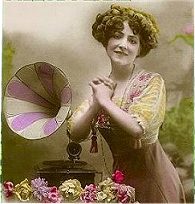
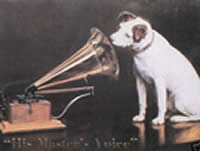
A music lover today must realize that the science of recording and playing back music in the 1910s and 1920s was imprecise at best. The recording and playback equipment had limited frequency and dynamic range, and the record discs were easily scratched, but contemporary music lovers of that era accepted the limitations of their victrolas and gramophones and enjoyed playing their cylinders and records regardless.
We must also adopt this attitude if we are to fully appreciate these priceless recordings on this 6-disc CD set. We cannot expect to hear the high quality audio we are used to hearing today. These records were recorded even before the age of "Hi-Fidelity." Although modern digital technology was used to remove most of the scratches and hisses on these records, some scratches and hisses remain, but they are tolerable, to me at least. In any case a listener can compensate by decreasing the level of the treble tone control on his/her stereo amplifier.
If I close my eyes I can pretend that I'm living back in the Roaring Twenties, entertaining my sweetheart on a parlor sofa in a decorated living room. I crank up my state-of-the-art "His Master's Voice" Victor Talking Machine, and play these records which I might have purchased from Pietro himself when he traveled through town and performed at our neighborhood vaudeville theater!
Conclusion To summarize: I was thrilled to listen to this comprehensive compilation of Pietro Deiro's 78 RPM recordings—L'abilità artistica di Pietro Deiro—and I think you will also be thrilled. My congratulations to Bella Musica, Roma for releasing these historic treasures by the "Daddy" of the Accordion. I believe this 6-CD set will truly be a treasured addition to the library of any discriminating connoiseur of accordion and early twentieth-century popular music.
MP3 Soundfile Excerpts
Stars and Stripes Forever by John Philip Sousa Italian Airs I La Spagnola by Vincenzo di Chiara Trieste Overture by Pietro Deiro Turkey In The Straw (A Rag Time Fantasy) by Otto Bonnell Babes In Toyland by Victor Herbert Vivacity Polka by Pietro Deiro La Cumparsita by Gerardo Matos Rodríguez (trio with 2 accordions & violin) Accordionola by Frank Gaviani (duet with Frank Gaviani)